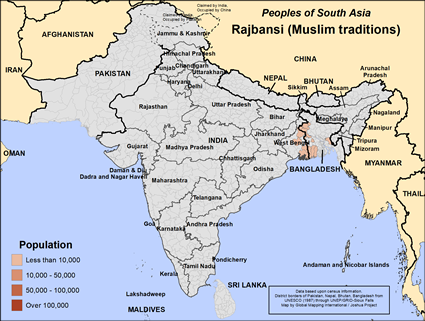Rajbansi in India

Photo Source:
Copyrighted © 2026
India Missions Association All rights reserved. Used with permission |

Map Source:
People Group data: Omid. Map geography: UNESCO / GMI. Map Design: Joshua Project
|
| People Name: | Rajbansi |
| Country: | India |
| 10/40 Window: | Yes |
| Population: | 3,400 |
| World Population: | 13,300 |
| Primary Language: | Bengali |
| Primary Religion: | Islam |
| Christian Adherents: | 0.00 % |
| Evangelicals: | 0.00 % |
| Scripture: | Complete Bible |
| Ministry Resources: | Yes |
| Jesus Film: | Yes |
| Audio Recordings: | Yes |
| People Cluster: | South Asia Muslim - other |
| Affinity Bloc: | South Asian Peoples |
| Progress Level: |
|
Introduction / History
The Rajbansi people are related to the ancient Koch Dynasty; so much so that they are often called the Koch people even today. The Koch Dynasty was in what is today northeastern India. They live either in India's state of West Bengal or Bangladesh today. Most live in Bangladesh.
Muslim invaders began conquering the Hindu regions of what is now Bangladesh in the twelfth century. When many of the Bengali tribes were overrun in 1600-1700 A.D. by Muslims, they took refuge in the hills. They later returned and settled in the adjoining plains where most have continued to live. A small number of the Rajbansi people converted to Islam in the Bengali speaking regions of West Bengal and Bangladesh.
What Are Their Lives Like?
Like many other communities in India, the Rajbansi people are farmers today, though they are becoming increasingly urban. Their homes tend to be rectangular with an inside area where they grow betel nut and fruit trees. This pattern helps them protect themselves against wild animals. It also provides a way to enjoy fresh air, and the chance to grow their own gardens without their food being stolen.
Music is an important part of Rajbansi culture. They enjoy stringed instruments like the dotora, gongs, bells and wind instruments. An excellent way to reach them for Christ would be through using their form of music for worship tunes.
What Are Their Beliefs?
The Rajbansi people are Sunni Muslims who believe that the supreme God, Allah, spoke through his prophet, Mohammed, and taught mankind how to live a righteous life through the Koran and the Hadith. To live a righteous life, you must utter the Shahada (a statement of faith), pray five times a day facing Mecca, fast from sunup to sundown during the month of Ramadan, give alms to the poor, and make a pilgrimage to Mecca if you have the means. Muslims are prohibited from drinking alcohol, eating pork, gambling, stealing, slandering, and making idols. They gather for corporate prayer on Friday afternoons at a mosque, their place of worship.
The two main holidays for Sunni Muslims are Eid al Fitr, the breaking of the monthly fast and Eid al Adha, the celebration of Abraham's willingness to sacrifice his son to Allah.
Sunni religious practices are staid and simple. They believe Allah has pre-determined our fates; they minimize free will.
In most of the Muslim world, common people depend on the spirit world for their daily needs since they regard Allah as too distant. Allah may determine their eternal salvation, but the spirits determine how well they live daily. For that reason, some Muslims appease spirits using charms and amulets to help them with spiritual forces. More orthodox Muslims consider these practices heretical and un-Islamic.
What Are Their Needs?
They need the Holy Spirit to open their eyes so they can see Jesus as he is. As it stands, they probably have no gospel witness among them.
Prayer Points
Pray for many from this unreached people group to understand both God's judgment and his majestic glory and goodness.
Pray for loving workers to go to the Rajbansi people, and for their hearts to be ready to receive their savior.
Pray for a chain reaction of families reaching families that result in thousands of new disciples who share their faith with others.
Pray for grace and truth expanding into their entire society as all believers learn to love others.